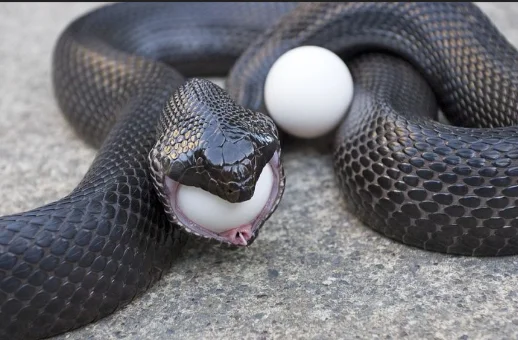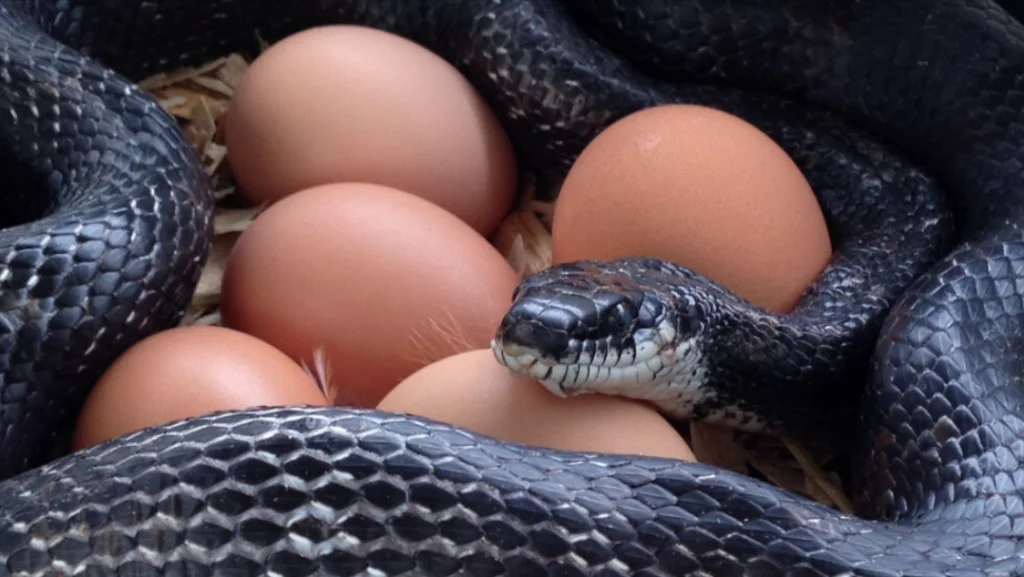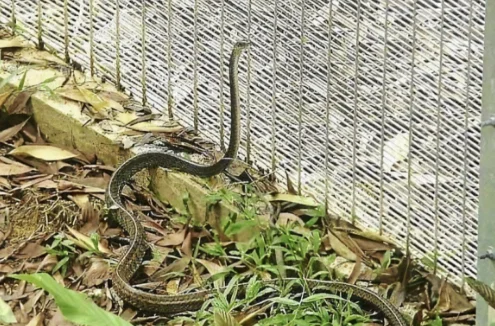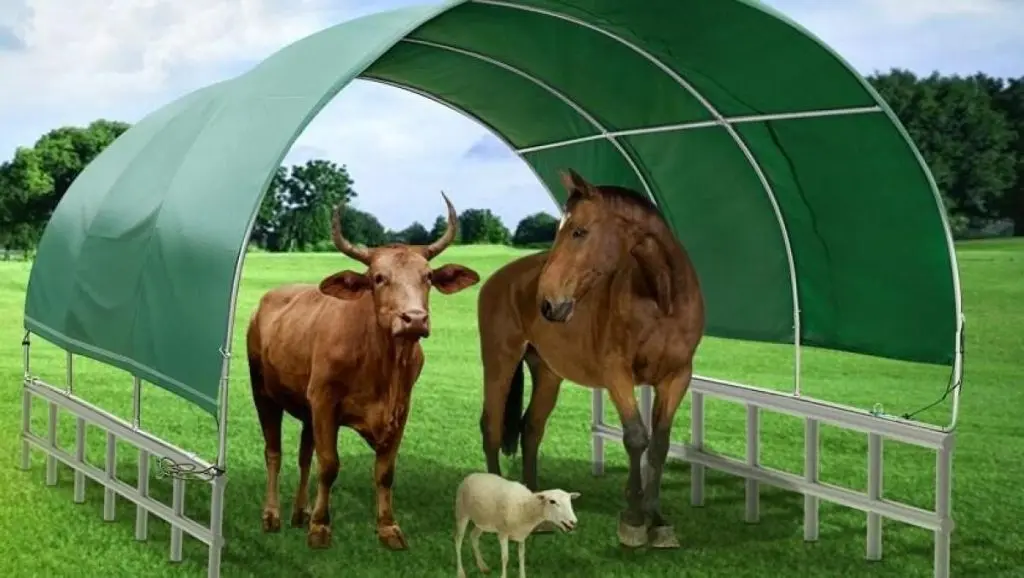Have you ever wondered, How to Keep Snakes Out of Chicken Coop? We know that the thought of snakes getting into your coop can be downright terrifying. After all, you want to keep the area secure and ensure that your chickens have the safest environment possible. These predators can prey on eggs, baby chicks, and even adult chickens, so it’s essential to take important steps and preventative measures to keep snakes out of your chicken coop!
In this comprehensive guide, we will share lots of tips on how to keep snakes out of your chicken coop. Keep reading to learn everything from snake-proofing fences and electric barriers to applying natural repellents like cayenne pepper around the perimeter of your property.
Let’s get started!
Table of contents
- Insights from Expert Tips
- Mouse-Free Zone: A Cozy Coop Strategy
- Egg Collection and Golf Ball Magic
- Wire Wisely: The Smallest Gauge Matters
- Trimming Tales: A Snake-Free Landscape
- Nightly Snake Checks: A Before-Bed Routine
- Sulfur and Spice: A Perimeter Shield
- Wormwood and Garlic Perimeter Planting
- Cowboy Wisdom: The Lasso Defense
- Understanding Snake Behavior
- Rat Snakes
- Corn Snakes
- Garter Snakes
- Copperheads
- King Snakes
- Why are snakes actually attracted to chicken coops?
- What are some Potential Risks Posed by Snakes to Chicken Coops?
- How Can You Tell if Snakes Are Around Your Coop?
- Shed Snake Skins
- Unusual Disturbances
- Tracks
- Fecal Deposits
- Egg Shells
- Unsettled Chickens
- Unexplained Disappearances
- Natural Deterrents: Myth or Reality?
- Practical Tips from Experienced Chicken Keepers
- Coop Design for Snake Resistance
- FAQs
- Bottom Line
Insights from Expert Tips
Experts have spilled the beans on some super-effective snake deterrents that don’t require a degree in snake psychology.
These insights are like the secret sauce for your question ‘how to keep snakes out of chicken coop. Here are the most effective ones:
Mouse-Free Zone: A Cozy Coop Strategy
- Why it Matters: Snakes are opportunistic feeders, and where there are mice, snakes follow. Keeping your coop mouse-free not only maintains cleanliness but also removes a potential food source for slithering intruders.
- How to Do It: Implement effective mouse control measures, such as sealing entry points, using traps, and maintaining a tidy coop. Check out our guide [HERE](insert link) for detailed tips on achieving a mouse-free haven for your chickens.
Egg Collection and Golf Ball Magic
- Why it Matters: Snakes love cozy nests, but replacing eggs with golf balls disrupts their cozy plans. It’s a simple yet effective trick to discourage snakes from setting up shop in your chicken coop.
- How to Do It: Make it a routine to collect eggs regularly, leaving behind golf balls in the nests.
Wire Wisely: The Smallest Gauge Matters
- Why it Matters: Snakes can be surprisingly adept at squeezing through small openings. Opting for the smallest gauge wire on vents and your pen/run ensures that your coop becomes an impenetrable fortress against these stealthy invaders.
- How to Do It: Choose the smallest gauge wire suitable for your coop’s structure and ventilation needs. This small but significant step enhances the overall security of your chicken haven.
Trimming Tales: A Snake-Free Landscape
- Why it Matters: Tall grasses, fallen logs, and branches create ideal hiding spots for snakes. Trimming these elements not only beautifies your coop surroundings but also eliminates potential snake havens.
- How to Do It: Regularly trim tall grasses, remove fallen logs, and clear away branches around the run. By doing so, you create an environment that snakes find less appealing, reducing the likelihood of unwelcome visitors.
Nightly Snake Checks: A Before-Bed Routine
- Why it Matters: Snakes are nocturnal creatures, and they love the cover of darkness. Conducting thorough checks of nesting boxes and the coop/house floor before locking up at night ensures a snake-free bedtime for your chickens.
- How to Do It: Make it a habit to inspect nesting boxes and the coop interior every night. This simple routine adds an extra layer of protection and peace of mind for both you and your feathered friends.
Sulfur and Spice: A Perimeter Shield
- Why it Matters: Snakes have a strong sense of smell, and certain scents repel them. Sprinkling sulfur or cayenne pepper around your coop creates a scent barrier that snakes would rather avoid. Additionally, snakes dislike strong odors, and garlic, cinnamon, and clove oil fall into that category. So, spraying these aromatics around your coop keeps it smelling fresh.
- How to Do It: Gently sprinkle sulfur or cayenne pepper around the perimeter of your run and coop. This natural deterrent adds an extra layer of defense against potential snake intruders. You can also mix garlic juice, cinnamon, and clove oil with water and spray the solution around your coop. This simple and natural approach adds a pleasant scent while serving as an effective snake deterrent.
Wormwood and Garlic Perimeter Planting
- Why it Matters: Planting snake-repelling herbs like wormwood and garlic around your coop creates a natural barrier against these intruders. Snakes find these scents displeasing, deterring them from approaching.
- How to Do It: Integrate wormwood and garlic plants into your coop’s landscaping. This will enhance the protective shield around your chicken haven.
Cowboy Wisdom: The Lasso Defense
- Why it Matters: According to cowboy lore, snakes won’t cross certain barriers. Circling an old rubber hose, thick rope, or lead line around the perimeter of your coop mimics this concept, creating a symbolic barrier that snakes are reluctant to cross.
- How to Do It: Place an old rubber hose, thick rope, or lead line in a circle around your coop. This simple yet traditional method adds a touch of cowboy wisdom to your snake prevention strategy.
Understanding Snake Behavior
- What kind of snakes eat chicken eggs?
- Do black snakes eat chickens?
- Do snakes eat chickens?
It’s important to note that different snakes may act differently near a chicken coop
However, understanding how snakes behave is crucial for addressing how to keep snakes out of your chicken coop.
Common types of snakes that can be found in chicken coops include:
Rat Snakes
This is the most common species of snake that is a nuisance to chicken keepers. In some areas, these snakes are known as chicken snakes or black snakes and they prefer eating eggs. They are found across the U.S. and can grow up to 5 feet in length.

Corn Snakes
This is an East Coast species that can also be found in chicken coops. They are non-venomous and are known for their attractive coloration and relatively small size.
Garter Snakes
These snakes are commonly found in North America and are non-venomous. They are relatively small and feed on a diet of insects, earthworms, and small amphibians.
Copperheads
This is a venomous species of snake that can pose a threat to both chickens and humans. They are known for their distinctive copper-colored head and are found in the southeastern United States.
King Snakes
These snakes are non-venomous and are known for their ability to constrict and eat other snakes, including venomous ones. They can be beneficial in controlling the population of other snakes in the area.
Why are snakes actually attracted to chicken coops?
When you know the actual reasons for attraction you won’t face any difficulty keeping snakes away from your chicken coop. Here are some reasons why snakes are attracted to chicken coops:
- Snakes are drawn to the warmth generated by chicken coops, especially during cooler seasons.
- The lingering scent of chicken feed can attract snakes seeking an easy meal.
- The allure of fresh eggs can make your coop a target for snakes looking for a quick snack.
- The shaded and concealed areas in and around the coop provide ideal hiding spots for snakes.
- Overgrown bushes and tall grass near the coop can be attractive hiding places for snakes.
What are some Potential Risks Posed by Snakes to Chicken Coops?
- Snakes may pose a threat to chickens, especially smaller ones or newly hatched chicks.
- Snakes can raid nests and consume eggs, impacting your egg production.
- The presence of snakes can cause stress among your chickens, affecting their overall well-being.
- In regions with venomous snakes, there’s a risk of bites to both chickens and humans if the snakes feel threatened.
- Snakes can carry diseases that may be transmitted to chickens, posing health risks to your flock.
It’s better opting for a chicken coop with features designed to deter snakes. VEVOR’s chicken coop, with its snake-resistant features, provides a reliable solution to mitigate these potential threats and ensures a safer and healthier environment for your cherished poultry.
How Can You Tell if Snakes Are Around Your Coop?
Ever found yourself wondering, Are there sneaky snakes near my chicken coop? If so, keep an eye out for these simple cues, and you’ll know how to keep snakes out of your chicken coop!

Shed Snake Skins
Finding shed snake skins in or around the coop is a clear indicator of snake activity.
Unusual Disturbances
Disturbed bedding or nesting materials may suggest recent snake presence.
Tracks
Snake tracks leading to and from the coop area are visible signs of their movement.
Fecal Deposits
Snake droppings near or inside the coop can signal their recent visits.
Egg Shells
Broken or empty eggshells in and around the coop may indicate snake predation.
Unsettled Chickens
If your chickens seem stressed, agitated, or avoid certain areas, it could be a reaction to a nearby snake.
Unexplained Disappearances
Sudden disappearances of eggs or chickens without an apparent cause may be linked to snake activity.
Natural Deterrents: Myth or Reality?
Does lime keep snakes away?
Does sulfur keep snakes away?
Do cats keep snakes away?
When it comes to natural deterrents for keeping snakes away from chicken coops, several methods are commonly discussed. Are they myths or reality? Are these myths the answer to your question of how to keep snakes out of your chicken coop?
Lime
Lime is often suggested as a snake repellent, but its effectiveness is questionable. There is limited scientific evidence to support the idea that lime can repel snakes. Lime may alter the ph of the soil, but relying solely on it as a deterrent might not yield reliable results.
Sulfur
Sulfur is another substance that is sometimes recommended as a snake deterrent. However, like lime, there is little scientific evidence to support its effectiveness. Applying sulfur may have a temporary impact, but it’s not a foolproof method for long-term snake prevention.
Cats
Cats are natural hunters and may help to keep snakes away from the coop. Their presence can deter snakes, and they may even catch and kill snakes that come near the coop. However, the effectiveness of cats as a snake deterrent can vary, and not all cats will actively hunt snakes. Moreover, cats can also attack and harm chickens, making them a risky presence around the coop.
Practical Tips from Experienced Chicken Keepers
Experienced chicken keepers can solve your problem of how to keep snakes out of your chicken coop with some great tips. So, let’s tap into the wisdom of seasoned chicken keepers who have faced the challenges firsthand. Here are actionable tips and strategies to fortify your coop and minimize snake entry points:
Seal Entry Gaps
Regularly inspect your coop for gaps and holes. Patch them up using materials like hardware cloth or mesh to prevent snakes from slithering in.
Elevate the Coop
Raise your coop off the ground. This not only deters snakes but also makes it a bit more challenging for them to access your feathered friends.
Trim Vegetation
Keep the area around your coop well-maintained by trimming bushes and grass. Eliminating hiding spots reduces the likelihood of snakes taking residence.
Install Motion-Activated Lights
Illuminate the surroundings with motion-activated lights. Snakes prefer darkness, and well-lit areas are less appealing to them.
Use Snake-Proof Fencing
Consider installing snake-proof fencing around your coop. This provides an additional barrier and discourages snakes from getting too close.

Regular Checks and Cleanup
Establish a routine for regular coop checks. Look for signs of snake presence, such as shed skins or disturbances, and promptly address any issues.
Employ Natural Deterrents
Experiment with natural deterrents like essential oils (e.g., cinnamon or clove) around the coop perimeter. While not foolproof, they might add an extra layer of protection.
Keep Food Sources Secure
Store chicken feed in secure containers to minimize scents that attract snakes. A well-contained food source reduces the likelihood of snake visits.
Create a Snake-Free Zone
Place snake traps or repellents strategically around the coop. While not universally effective, they can contribute to your overall prevention strategy.
Educate Your Flock
Train your chickens to be wary of potential threats. While it may sound unconventional, chickens can learn to avoid certain areas if they associate them with danger.
Coop Design for Snake Resistance
In the realm of chicken coops, VEVOR stands out as a pioneer in snake-resistant design, seamlessly merging functionality with innovation. Let’s unravel the features that make VEVOR’s chicken coop a fortress against slithery intruders and explore the design elements that effectively deter snake intrusion.
VEVOR’s Snake-Resistant Chicken Coop
Whether it’s a metal chicken coop or a large metal chicken coop, VEVOR’s coop takes pride in its snake-resistant prowess. How to keep snakes out of your chicken coop is not even a question as the robust hexagonal mesh enclosure serves as an impenetrable barrier, ensuring the safety of your feathery companions. Its meticulous construction leaves no gaps between the frame and the ground, guaranteeing a secure sanctuary free from unwarranted wildlife intrusion.
Design Elements That Deter Snake Intrusion:
- Robust Mesh Enclosure: The coop features a secure mesh that not only provides ventilation but also acts as a formidable defense against snake entry.
- Elevated Structure: With a raised design, VEVOR’s coop makes it challenging for snakes to slither in, adding an extra layer of protection for your chickens.
- Smooth Surfaces: The coop’s surfaces are slick, leaving no foothold for snakes attempting to breach its defenses.
FAQs
What scents attract snakes, and how can I mitigate them near my chicken coop?
Snakes are sensitive to various scents, with some being more alluring than others. To deter them, avoid leaving food scraps or strong-smelling substances around the coop. Additionally, consider using natural repellents like sulfur, cayenne pepper, garlic, cinnamon, or clove oil. These scents create a barrier that snakes find unpleasant, helping to keep them at bay.
Does a Rope Keep Snakes Away?
The notion of using a rope as a snake deterrent is rooted in the belief that snakes won’t cross certain barriers. While this is more of a traditional approach and lacks scientific backing, it might serve as a symbolic deterrent. For a more comprehensive strategy, focus on sealing entry points, employing snake-proof fencing, and maintaining a tidy environment.
Do Marigolds Keep Snakes Away?
Marigolds are not proven snake repellents. While they add aesthetic value to your surroundings, relying solely on marigolds may not provide effective snake prevention. Instead, consider planting snake-repelling herbs like wormwood and garlic, which have demonstrated effectiveness in creating a natural deterrent against snakes.
Bottom Line
In the pursuit of creating a secure haven for your cherished feathered companions, understanding how to keep snakes out of your chicken coop is paramount. By adopting a proactive approach and implementing practical strategies, you can minimize the risks posed by snakes and ensure the safety and well-being of your flock.
From exploring the intricacies of snake behavior around chicken coops to delving into effective deterrents, this comprehensive guide provides valuable insights. Choosing a snake-resistant chicken coop, such as VEVOR’s, adds an extra layer of defense against potential intruders. The design elements, like a robust mesh enclosure and elevated structure, exemplify the commitment to creating a sanctuary that prioritizes the safety of your chickens.




